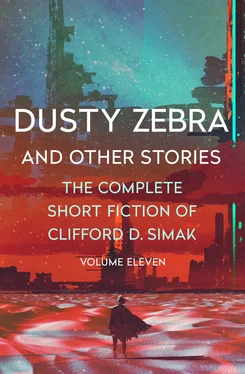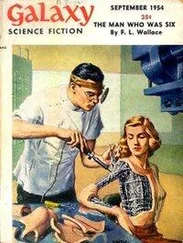And if the worst should come—which it never would with a setup like that—you’d have a place to which the entire nation could retreat, leaving to the enemy the empty, blasted cities and the lethally dusted countryside.
Sanctuary—that had been what Hudson had offered the then-secretary of state fifteen years ago—and the idiot had frozen up with the insult of it and had Hudson thrown out.
And if war did not come, think of the living space and the vast new opportunities—not the least of which would be the opportunity to achieve peaceful living in a virgin world, where the old hatreds would slough off and new concepts have a chance to grow.
He wondered where they were, those three who had gone back into time. Dead, perhaps. Run down by a mastodon. Or stalked by tigers. Or maybe done in by warlike tribesmen. No, he kept forgetting there weren’t any in that era. Or trapped in time, unable to get back, condemned to exile in an alien time. Or maybe, he thought, just plain disgusted. And he couldn’t blame them if they were.
Or maybe—let’s be fantastic about this—sneaking in colonists from some place other than the watched Wisconsin farm, building up in actuality the nation they had claimed to be.
They had to get back to the present soon or Project Mastodon would be killed entirely. Already the research program had been halted and if something didn’t happen quickly, the watch that was kept on the Wisconsin farm would be called off.
“And if they do that,” said the general, “I know just what I’ll do.”
He got up and strode around the room.
“By God,” he said, “I’ll show ’em!”
VIII
It had taken ten full days of back-breaking work to build the pyramid. They’d hauled the rocks from the creek bed half a mile away and had piled them, stone by rolling stone, to the height of a full twelve feet. It took a lot of rocks and a lot of patience, for as the pyramid went up, the base naturally kept broadening out.
But now all was finally ready.
Hudson sat before the burned-out campfire and held his blistered hands before him.
It should work, he thought, better than the logs—and less dangerous.
Grab a handful of sand. Some trickled back between your fingers, but most stayed in your grasp. That was the principle of the pyramid of stones. When—and if—the time machine should work, most of the rocks would go along.
Those that didn’t go would simply trickle out and do no harm. There’d be no stress or strain to upset the working of the force-field.
And if the time unit didn’t work?
Or if it did?
This was the end of the dream, thought Hudson, no matter how you looked at it.
For even if they did get back to the twentieth century, there would be no money and with the film lost and no other taken to replace it, they’d have no proof they had traveled back beyond the dawn of history—back almost to the dawn of Man.
Although how far you traveled would have no significance. An hour or a million years would be all the same; if you could span the hour, you could span the million years. And if you could go back the million years, it was within your power to go back to the first tick of eternity, the first stir of time across the face of emptiness and nothingness—back to that initial instant when nothing as yet had happened or been planned or thought, when all the vastness of the Universe was a new slate waiting the first chalk stroke of destiny.
Another helicopter would cost thirty thousand dollars—and they didn’t even have the money to buy the tractor that they needed to build the stockade.
There was no way to borrow. You couldn’t walk into a bank and say you wanted thirty thousand to take a trip back to the Old Stone Age.
You still could go to some industry or some university or the government and if you could persuade them you had something on the ball—why, then, they might put up the cash after cutting themselves in on just about all of the profits. And, naturally, they’d run the show because it was their money and all you had done was the sweating and the bleeding.
“There’s one thing that still bothers me,” said Cooper, breaking the silence. “We spent a lot of time picking our spot so we’d miss the barn and house and all the other buildings….”
“Don’t tell me the windmill!” Hudson cried.
“No. I’m pretty sure we’re clear of that. But the way I figure, we’re right astraddle that barbed-wire fence at the south end of the orchard.”
“If you want, we could move the pyramid over twenty feet or so.”
Cooper groaned. “I’ll take my chances with the fence.” Adams got to his feet, the time unit tucked underneath his arm. “Come on, you guys. It’s time to go.”
They climbed the pyramid gingerly and stood unsteadily at its top.
Adams shifted the unit around, clasped it to his chest.
“Stand around close,” he said, “and bend your knees a little. It may be quite a drop.”
“Go ahead,” said Cooper. “Press the button.”
Adams pressed the button.
Nothing happened.
The unit didn’t work.
IX
The chief of Central Intelligence was white-lipped when he finished talking.
“You’re sure of your information?” asked the President.
“Mr. President,” said the CIA chief, “I’ve never been more sure of anything in my entire life.”
The President looked at the other two who were in the room, a question in his eyes.
The JCS chairman said, “It checks, sir, with everything we know.”
“But it’s incredible!” the President said.
“They’re afraid,” said the CIA chief. “They lie awake nights. They’ve become convinced that we’re on the verge of traveling in time. They’ve tried and failed, but they think we’re near success. To their way of thinking, they’ve got to hit us now or never, because once we actually get time travel, they know their number’s up.”
“But we dropped Project Mastodon entirely almost three years ago. It’s been all of ten years since we stopped the research. It was twenty-five years ago that Hudson—”
“That makes no difference, sir. They’re convinced we dropped the project publicly, but went underground with it. That would be the kind of strategy they could understand.”
The President picked up a pencil and doodled on a pad.
“Who was that old general,” he asked, “the one who raised so much fuss when we dropped the project? I remember I was in the Senate then. He came around to see me.”
“Bowers, sir,” said the JCS chairman.
“That’s right. What became of him?”
“Retired.”
“Well, I guess it doesn’t make any difference now.” He doodled some more and finally said, “Gentlemen, it looks like this is it. How much time did you say we had?”
“Not more than ninety days, sir. Maybe as little as thirty.”
The President looked up at the JCS chairman.
“We’re as ready,” said the chairman, “as we will ever be. We can handle them—I think. There will, of course, be some—”
“I know,” said the President.
“Could we bluff?” asked the secretary of state, speaking quietly. “I know it wouldn’t stick, but at least we might buy some time.”
“You mean hint that we have time travel?”
The secretary nodded.
“It wouldn’t work,” said the CIA chief tiredly. “If we really had it, there’d be no question then. They’d become exceedingly well-mannered, even neighborly, if they were sure we had it.”
“But we haven’t got it,” said the President gloomily.
X
The two hunters trudged homeward late in the afternoon, with a deer slung from a pole they carried on their shoulders. Their breath hung visibly in the air as they walked along, for the frost had come and any day now, they knew, there would be snow.
Читать дальше












